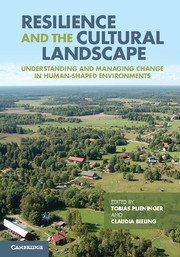 Resilience and the Cultural Landscape
Resilience and the Cultural Landscape Published online by Cambridge University Press: 05 November 2012
Introduction
Ecosystems have been converted in many parts of the world to meet human needs (MA, 2005). A rather new development has been the increasing exploitation of marine areas for human activities (Kraberg et al., 2011). Offshore wind farming (OWF) introduces significant new dynamics in the social–ecological systems concerned (Punt et al., 2009). Given the complexity of coastal and marine systems, and the fragile balance that exists in these systems between use and overuse, it is important to understand the potential consequences of OWF development and the processes that lead to system change. A key question is how OWF-induced changes manifest themselves in the ecological and social subdomains and whether changes in one domain can trigger changes in the others (Kinzig et al., 2006). Offshore wind farming has already been shown to have multiple impacts on marine ecological systems (Wilhelmsson & Malm, 2008), but how does this relate to changes in the marine landscape (seascape) and the socioeconomic system on the coast?
This chapter embeds OWF in a complex social–ecological system, which consists of marine ecosystems and planned OWF sites in the North Sea on the one hand and the administrative districts of North Frisia and Dithmarschen (Germany) on land on the other (Figure 11.1). The dynamics of the OWF system can be characterised broadly as follows. Nationally, economic instruments such as the German Renewable Energies Act provide a stimulus to private sector agents to invest in large-scale OWF projects (Figure 11.2), which then affect the integrity of marine ecosystems. This, in turn, impacts on the production of ecosystem goods and services utilised by humans, with attending impacts on human well-being (Busch et al., 2010; Kannen & Burkhard, 2009). Impacts on human well-being include direct impacts of OWF on the coastal economy through employment and income generation, but also indirect impacts on personal well-being through changes in marine ecosystem service provision. Using resilience and ecosystem services as conceptual background, this chapter focuses on possible regime shifts in the sea and effects across scales that may be triggered by OWF. It questions how regime shifts and their consequences can be traced and whether the resilience of a particular system should be encouraged.
To save this book to your Kindle, first ensure [email protected] is added to your Approved Personal Document E-mail List under your Personal Document Settings on the Manage Your Content and Devices page of your Amazon account. Then enter the ‘name’ part of your Kindle email address below. Find out more about saving to your Kindle.
Note you can select to save to either the @free.kindle.com or @kindle.com variations. ‘@free.kindle.com’ emails are free but can only be saved to your device when it is connected to wi-fi. ‘@kindle.com’ emails can be delivered even when you are not connected to wi-fi, but note that service fees apply.
Find out more about the Kindle Personal Document Service.
To save content items to your account, please confirm that you agree to abide by our usage policies. If this is the first time you use this feature, you will be asked to authorise Cambridge Core to connect with your account. Find out more about saving content to Dropbox.
To save content items to your account, please confirm that you agree to abide by our usage policies. If this is the first time you use this feature, you will be asked to authorise Cambridge Core to connect with your account. Find out more about saving content to Google Drive.